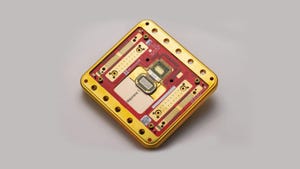HP Automates Data Center for DevOpsHP Automates Data Center for DevOps
Orchestrated Datacenter software bundle features out-of-the-box support for Chef, OpenStack, MongoDB, CouchDB and other open source technologies
May 21, 2014

HP has introduced an automation and cloud management solution called Orchestrated Datacenter, which helps optimize data center operations to meet infrastructure and application delivery requirements. The solution combines several existing products and features and integrates with a number of open source technologies, such as Chef, OpenStack and Hadoop, but has some new enhancements as well.
Manoj Raisinghani, senior director of global product marketing in automation and cloud at HP, said the solution was cutting out a lot of repetition and duplication and making the entire data center stack automated and orchestrated. It is meant to enable IT teams to design, customize and deploy services in test and production across traditional environments, as well as public and private clouds.
"We're aiming at the DevOps paradigm," he said. "We’re bringing together [application development] teams and IT."
According to IDC, data center automation and orchestration software is one of the IT industry's fastest growing management software categories.
“IT decision makers recognize there are significant business agility improvements as well as cost savings to be had by automating and orchestrating a wide range of infrastructure, middleware and application provisioning and configuration activities,” said Mary Johnston Turner, an IDC analyst. “IT architects and CIOs want simpler, more integrated and effective orchestration solutions that deliver value right out of the box. HP's Orchestrated Datacenter Solution addresses these priorities by combining important open source technologies such as OpenStack and Chef with HP's full-stack automation technologies and operational best practices.”
A brand new offering that is part of the announcement is HP Enterprise Maps, an ArchiMate-certified enterprise architecture solution. “We talk about plan, build and run, and we spend a lot of time on build and run,” said Raisinghani. “On the plan side, they use things like Excel and Word and discussions – basic service-level planning.
"Enterprise Maps is brand new. It lets architects come together and look at all the business service requirements, see what’s the actual transformation and the actual map. You can take requirements and map them back to a service. Figure out which components have to be architected, which apps lend themselves well to cloud, which don’t. It brings business-level requirements to the operations level.”
Chef support out of the box
Cloud Service Automation 4.1, the latest release of HP's solution for designing services through a self-service catalog, can now incorporate Chef recipes in the design. "Now you’re creating an entire service model," Raisinghani said.
Out-of-the-box Chef support is an example of the company's increased focus on open-source technologies to appeal to developers. “We hear about [application development] teams doing stuff in the open world and we are addressing this very heavily," he said.
Chef is emerging as an open-source standard to define application and system configurations and has growing appeal in modern application development communities.
“App teams are doing their own things using Chef. They’re using it because it’s open source. Teams are using this to create basic recipes. Now comes the time for IT to put it into production. IT tools are not matching up with what Dev teams are using, so we embraced Chef. It’s policy-based automation. You can import the recipe, put all the controls and effectively from here on you don’t need to recreate it. It’s bringing together IT and AppDev guys.”
The new Operations Orchestration 10.1, an orchestration tool, has more than 5,000 operation workflows. Server Automation 10.1 has a new Automation Insight capability, which unifies reporting across products and data sources to measure status, compliance, server operations and frequency of updates.
Supporting OpenStack comes from the same set of motivations. "We embraced OpenStack," Raisinghani said. "It used to be a lot of manual work. Not anymore."
There’s also out-of-the-box support for Hadoop and no-SQL databases like MongoDB, CouchDB and Hbase.
About the Author
You May Also Like







